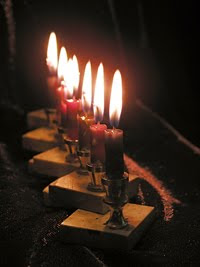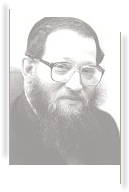 Good Shabbos Everyone. The negotiations were taking much longer than expected. Two representatives of a real estate conglomerate were trying to complete the purchase of an office building in downtown Mexico City, but the lawyers were discussing the details slowly and meticulously. Every office had to be inspected, the insurance policies verified, and the terms of payment specified to the last penny.
Good Shabbos Everyone. The negotiations were taking much longer than expected. Two representatives of a real estate conglomerate were trying to complete the purchase of an office building in downtown Mexico City, but the lawyers were discussing the details slowly and meticulously. Every office had to be inspected, the insurance policies verified, and the terms of payment specified to the last penny. Jacobo Sherem, the managing partner of the owners' group, was desperate to complete the transaction. With every passing moment, he was becoming more impatient and exasperated.
An architect by profession, Jacobo had been trying to sell this particular office building for months, so that he could finally turn a profit on his investment. He had designed, bought and sold buildings in the past, but this building on Calle Presa Salinillas had been his biggest investment, and so far it had been a losing proposition for his group. Due to the depressed financial climate in Mexico, most of the office space was unoccupied.
As the hours passed, Jacobo became increasingly nervous. The buyers had told him unequivocally that they were leaving Mexico on the first plane out the next morning, which was Saturday. They would not delay their trip. If they could complete the purchase that day, that would be wonderful; otherwise they would cancel the negotiations and move on to prospective deals in other countries.
It was the late hour of the day, Friday, that was putting pressure on Jacobo. For the last year he had been attending evening study classes in the Aram Tzovah Kollel in the Polanco section of Mexico City. He studied Torah a few nights a week, but he was not as yet shomer Shabbos (Sabbath observant). After many discussions and much introspection and inspiration from avreichim (kollel members) at Aram Tzovah, Jacobo and his wife Sophia were inching closer to total commitment to Shabbos observance. Jacobo had already started going to shul every Friday night and his office was closed on Shabbos, but he and Sophia were not yet complete Sabbath observers.
Frustrated at being so close to, yet so far from, fulfilling his dream of selling the building, Jacobo looked at his watch and saw that there was less than an hour and a half to Shabbos. Reluctantly he told the prospective buyers that the negotiations would have to continue Sunday or Monday - he had to leave and close his office. The buyers threatened that it was now or never, for they were flying out of the country the next day. But Jacobo would not budge. Shabbos was coming. He hadn't missed a Friday night in shul in weeks and he wasn't going to miss tonight. The buyers were incredulous that Jacobo would scuttle a deal that would lift him out of the financial doldrums, but he would not be moved. The parties to the negotiations bid each other a final farewell, and Jacobo went home to prepare for Shabbos.
He couldn't help but second guess himself. Had he acted correctly? There would be other Shabbosos when he would be in the synagogue, but now he might never be able to sell this building that was becoming an albatross around his financial holdings. He tried to enjoy the Shabbos, but it was difficult. An internal debate raged in his mind. He was proud of his commitment but he wondered if it was worth the price.
Two weeks later, early Thursday morning, September 19, 1985, (during the Selichos of Aseres Yemei Teshuvah) Mexico was struck by the greatest tragedy in its history. In a matter of seconds, a monstrous, rumbling earthquake gashed and shook Mexico City, toppling buildings, swallowing homes, wreaking havoc and bringing instantaneous death to thousands of people! Within 24 hours, as the country staggered to adjust to the shock and magnitude of the Thursday tragedy, an aftershock staggered the city. The number of people killed in these earthquakes reached a shocking 4,541. Another 14,236 were injured and 2,637 required hospitalization. In the downtown district there was utter devastation. People searched in vain for relatives and friends, but it was mostly for naught. The destruction, mayhem and sorrow was beyond imagination.
Yet, amidst all the devastation, one building remained standing - the one Jacobo couldn't sell. Its windows were blown out and some of the facade of the building had peeled off, but remarkably it was structurally sound. The Mexican government had to regroup. Aid and rescue efforts had to be directed and coordinated. People needed the assurance that the government was functioning and accessible. Thus within days of the earthquakes, Jacobo's building, conveniently located downtown, was checked for its strength and stability.
When it passed inspection, the government bought most of the offices in the building and the remaining space was sold to large corporations who had lost their offices when other buildings collapsed or were deemed unsafe. Jacobo's extraordinary profit was far beyond what he would have made had he sold the building weeks before. The deals for his building propelled Jacobo into a category of wealth he never imagined.
The Hashgachah Pratis (Divine Providence) of the Shabbos not allowing him to sell the building propelled him into being a total Shabbos observer. Jacobo and Sophia never told the story to anyone. Word got out that their building was sold to the government, but no one in the community knew about the frantic Friday negotiations two weeks before the earthquakes, and Jacobo's decision to close his office for Shabbos.
Years later, in the palatial lobby of his new magnificent office building, Jacobo and Sophia tendered a grand party in honor of his first completion of a Talmudic tractate, which he had studied for several years with Rabbi Shea Deutsch (now teaching in Lakewood, N.J.) at the Aram Tzovah Kollel. There, in the presence of rabbis, community leaders and friends, Jacobo told the story that changed his life. (Reflections of the Maggid, Rabbi P. Krohn p. 193)
We read about the holiness of Shabbos in this week's parsha Vayakhel. As it states in the verse "On six days, work may be done, but the seventh day shall be holy for you, a day of complete rest for Hashem; whoever does work on it shall be put to death." (Shemos 35:2)
Shabbos is the paradigm of Judaism. Why is that so? Because on Shabbos, we must control our actions, speech, and thought, the three realms of behavior. We may not do certain actions on Shabbos, such as driving, which involves lighting fires. We may not speak about certain topics on Shabbos such as business dealings. And it is preferable not even to think about weekday activities on Shabbos. Thus, Shabbos trains us to control our behavior in life. Therefore, Shabbos is the paradigm of Judaism. Because the essence of Judaism is modifying our behavior to live according to Hashem's rules, not our own rules.
from Good Shabbos Everyone.









.jpg)



















No comments:
Post a Comment